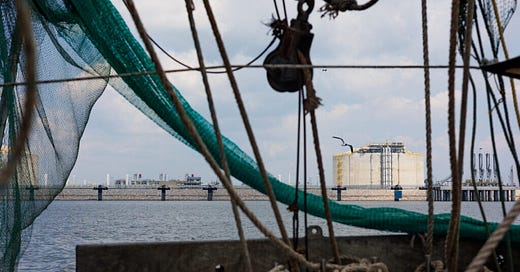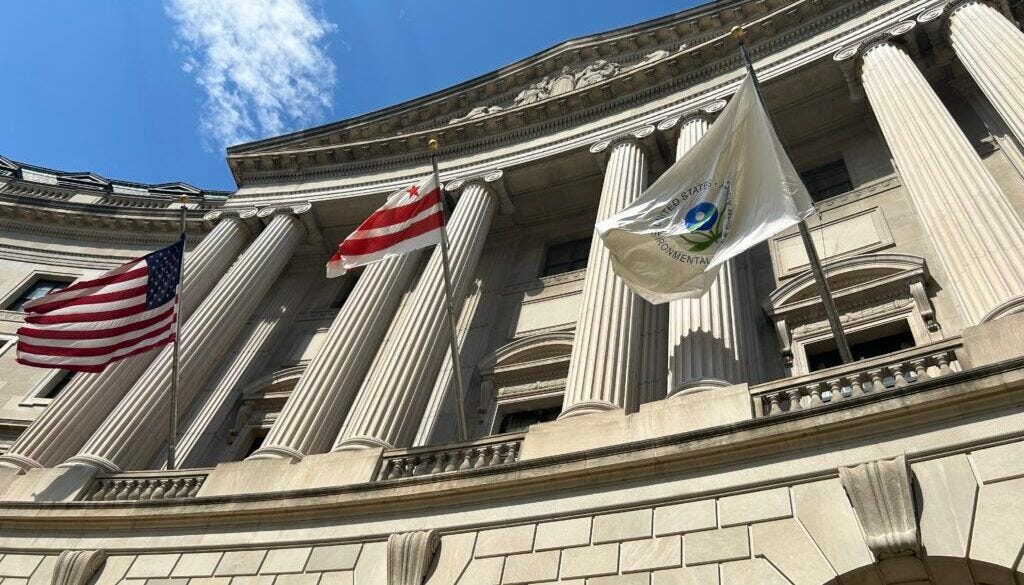Must-read recap: The New Lede's top stories
Natural gas exports threaten Gulf Coast fishing communities; EPA announces $4.6 billion in climate pollution grants; CA takes on Big Oil; "Green" cleaning products may improve indoor air quality.
Booming natural gas exports threatening Gulf Coast fishing communities
Most mornings, Nathan Berwick rises well before dawn at his home in Calcasieu Parish, Louisiana, setting out on nearby Lake Charles in a small fishing boat to check his crab traps. If it’s not too hot and the water is calm, Berwick’s family occasionally joins him on the boat. His eleven-year-old daughter enjoys playing with baby crabs that fall from the traps as Berwick hauls them from the water.
Berwick comes from a long line of crabbers dating back to the 1820s, when his ancestors first arrived in the heel of the Louisiana boot – the state’s southwest corner.
“Thirty years from now I want my children to be able to say, ‘this is my home, this is where eight generations of Berwicks have lived,’” he said.
But this simple dream is in danger from a growing threat facing Berwick and others who contribute to – and depend on – the $1.5 billion fishing industry along Louisiana’s Gulf Coast.
The fossil fuel industry has identified the Gulf region as a key site for expanding liquified natural gas (LNG) export terminals. Eight new terminals are planned for southwest Louisiana alone, with a total of at least 16 new LNG projects anticipated for the Gulf region in coming years. (Read the rest of the story.)
EPA announces $4.6 billion in grants to combat climate pollution
The US Environmental Protection Agency (EPA) announced $4.6 billion in competitive grants on Wednesday to fund state, city, and Tribal programs designed to reduce climate pollution, advance environmental justice, and transition to clean energy.
The announcement came as business leaders, nonprofits, and government officials convene in New York for the annual Climate Week NYC, which takes place alongside the UN General Assembly.
The grants mark the second wave of funding through the agency’s Climate Pollution Reduction Grants (CPRG) program, which was developed under the Inflation Reduction Act. The CPRG program is intended to advance the Biden administration’s Justice40 Initiative by helping to ensure that overburdened communities receive federal climate change funding. The newly available grants will fund projects planned using the initial $250 million in CPRG funding announced in March. (Read the rest of the story.)
Postcard from California: State takes on Big Oil for decades of climate lies
(Opinion columns published in The New Lede represent the views of the individual(s) authoring the columns and not necessarily the perspectives of TNL editors.)
California fired its opening salvo against the oil and gas industry two years ago, with Gov. Gavin Newsom’s order banning the sale of new gasoline-powered cars and trucks after 2035. In April, the offensive escalated, as the California Air Resources Board (CARB) ordered a phaseout of diesel trucks and locomotives starting in 2036. The state opened another front in June, establishing a watchdog agency to investigate gasoline-pump price spikes and recommend fines for oil companies deemed guilty of gouging customers.
Now the state has dropped its biggest bombshell yet: a monumental lawsuit against five of the world’s largest petrochemical companies for their “decades-long campaign of deception” about the harm of their products to the planet’s climate, and the disastrous and costly impacts of the climate crisis on California.
The 135-page lawsuit, filed last week in San Francisco County Superior Court, alleges that ExxonMobil, Shell, Chevron, ConocoPhillips and BP (formerly British Petroleum) knew since the 1950s that burning fossil fuels would heat up the climate with devastating consequences, but covered up the truth instead of alerting the public. The suit also names as a defendant the American Petroleum Institute (API), the industry’s trade association. The defendants are accused of fraud, negligence, product liability, false advertising and creating a public nuisance. (Read the rest of the opinion column.)
Use of “green” cleaning products may improve indoor air quality, study says
Consumers can slash their exposure to certain types of indoor air pollution by using “green” labeled cleaning products, according to new research.
In a study published this month in the journal Chemosphere, researchers said they detected nearly 200 hazardous volatile organic compounds (VOCs), present in common household cleaning products — some at levels that could pose a risk to human health. Products that were labeled “green” or “fragrance-free” were less likely to contain VOCs, they found. The researchers detected over 500 VOCs total.
Many VOCs have both immediate health impacts, such as eye or throat irritation, and long-term impacts, such as nervous system damage or cancer.
“This study is a wake-up call for consumers, researchers and regulators to be more aware of the potential risks associated with the numerous chemicals entering our indoor air,” said Alexis Temkin, an author of the study and senior toxicologist at the Environmental Working Group (EWG), a research and consumer advocacy organization. (Read the rest of the story.)






